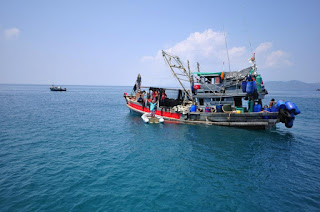Project Manaia recently teamed up with MABR to work together on getting this pristine island group along the border on Myanmar (Burma) and Thailand protected… here are the latest updates from the project!
We are happy to announce changes in our MABR Research Expeditions.
This year will feature a diversified but integrated approach to the
preservation and exploration of the Mergui Archipelago. With the help of
our new team, William Ruzek (Geographer), Manuel Marinelli (Marine
Biologist), and Marley Walker (Journalist), our Expeditions will increase
the study, appreciation and conservation of the Archipelago across the borders of Myanmar and Thailand.
This year will feature a diversified but integrated approach to the
preservation and exploration of the Mergui Archipelago. With the help of
our new team, William Ruzek (Geographer), Manuel Marinelli (Marine
Biologist), and Marley Walker (Journalist), our Expeditions will increase
the study, appreciation and conservation of the Archipelago across the borders of Myanmar and Thailand.
The MABR Expeditions will focus on these four 'M' themes:
Mapping, Monitoring, Marine megafauna, Moken people
While each expedition will have a primary theme and therefore itinerary, every cruise
will incorporate all “4M's” throughout the cruise.
Mapping: Thanks to our sponsors and paying participants for the first time we shall be able to equip SeaNomad with more sophisticated electronics. A advanced sonar system will be installed to accurately map the ocean floor and coral reefs quickly and in high resolution. With only a few boat passes, accurate maps and 3D models can be created highlighting sea floor cover, reef structure and size and other interesting underwater features. This is to keep track of what we
are doing and where we are. Any observations of any kind underwater and above will be recorded and pinpointed geographically, allowing precise maps and data collection
Monitoring: We will be able to not only monitor sightings of birds, marine life and marine megafauna, but also we will be collecting samples of plankton and micro- plastics. We will also be monitoring different parameters, chemical composition and water quality. By monitoring various aspects of the islands we can create a “full picture” of the current conditions.
Thanks to a larger array of cameras we
shall be able to document the activities, above and below water. This will help in identifying marine species and assist in the reef health assessments. We will also be able to release regular video-reports, documenting our work and progress.
June 2015
Marine megafauna: Apart from our monitoring during the expeditions, we will also survey island beaches for turtle nests, seagrass beds for dugong tracks and interview local fishermen about their daily catch. A particular emphasis will be placed on sharks throughout the islands. Sharks have been exploited for their fins, and also regularly consumed. We will conduct periodical surveys at fishing harbors and boats to understand the rate at which they are consumed and what
species are being caught. Our underwater video surveys will also help to identify any sharks species while we sail throughout the islands.
Moken people: The last seafaring sea gypsies have been largely settled on the islands. Many have died from malaria and other diseases, while others have formed families with local fishermen. Their original boats are now rarely seen as many have been destroyed during the Tsunami, old shipbuilders have died, and the law now forbids the felling of large trees. We want to research the impact of modernization on their culture and lifestyle, but also to use modern means to better their lives, record their traditions, way of life, and give them a chance contribute to the protection of their habitat. We will be conducting
various interviews with villages in the islands as well as “settled” villages within Thailand. Select families will receive solar panels and cameras to help assist in daily living and help to record the wildlife around them.
With this approach we hope to better preserve, monitor and protect this unique region for future generations. Each expedition will increase our understanding, species lists, and survey database of these unique islands. Though without your help it is not possible. Please consider supporting us and together we can explore and preserve the Moken Archipelago.
Feel free to contact with any questions or for more information to join us on an Expeditions!
www.projectmanaia.at
info@projectmanaia.at







Comments
Post a Comment